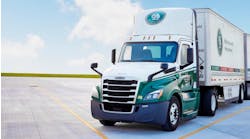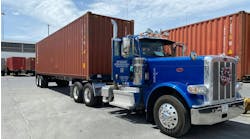When truckers get together these days, all they want to talk about is their computers.
Although truckload carriers only run about one-third of all the commercial equipment out on the road, they occupy a highly visible position in the industry. Since deregulation, they've transformed themselves from small, informal, and peripheral operations to aggressive, growing businesses that combine high productivity with almost constant innovation. In many ways, they are poster children for the American entrepreneurial ideal that celebrates competitive spirit, energy, and a can-do attitude.
That spirit and energy was much in evidence at the Truckload Carriers Assn.'s recent annual meeting. Fleet turnout at the event was extremely high. The location -- Hawaii -- had something to do with that, especially combined with generally strong TL profits last year. But even when its meetings are in less attractive locations, TCA enjoys strong fleet participation prompted in part by a cordial, but active, curiosity about the competition. They may be fierce competitors when it comes to freight, but the people who run truckload operations like to talk to one another about their business.
This year there were three main topics of conversation, whether those exchanges were private one-on-ones during social events or public dialogs carried on as part of the organized program. As in years past, drivers accounted for a good deal of the talk. And with Wall Street still running with the bulls, truckload stock prices also figured prominently in much of the talk. No surprises there.
The third popular topic, however, did surprise me a bit, if only because it cut across fleet size, market, operation, and even basic business approach. Whether they owned a specialized tank fleet with 159 tractors or ran one of the giant truckload operations, people wanted to talk about information technology.
It wasn't the bits-and-bytes babble of a computer show, though. Instead, the talk centered around the need today for constant innovation and investment when it comes to fleet information systems. As the head of one large fleet sees it, "Our highways are being paved with technology."
While the technology might be complex, the core issue couldn't be simpler: efficiency. The chief executive at another fleet said it best when he told his gathered competitors, "The most cost-efficient assets will win." And though he considers a fleet's people, trucks, and systems all to be assets, he firmly believes that "technology is the only way to continue reducing costs."
The last decade brought huge efficiencies from new equipment technologies in the form of better fuel economy, vastly improved durability, and increased trailer capacities. Now, however, aggressive truckload carriers are turning to information technology because those equipment-driven productivity gains are beginning to tail off, according to the president of another national truckload carrier. As most TCA members acknowledge, the new frontier for fleet efficiency is equipment utilization or yield management. And that means having the ability to gather, analyze, and use immense amounts of data in very short periods of time.
Surprisingly, some of the largest truckload carriers say they are being forced to develop their own information systems because they can't find suitable systems to purchase. Outsourcing information services cropped up in many conversations, but there was a real undercurrent of wariness when fleet executives started talking about turning over such critical business components to an outside vendor. Still, most of the midsize and smaller carriers recognize that they don't have the resources to continue developing the information systems they'll need to remain competitive. Their only choice is to rely on suppliers to lead that charge, whether it be as outsourced service providers or more traditional vendors.
Whatever path truckload carriers, or any other type of fleets, take to acquire that next generation of information technology, one thing is clear -- fleets will have to become more sophisticated about cost analysis. As one TCA member put it, "I know I have to have new information technology, but I still have to pick the best. That's the real issue."


